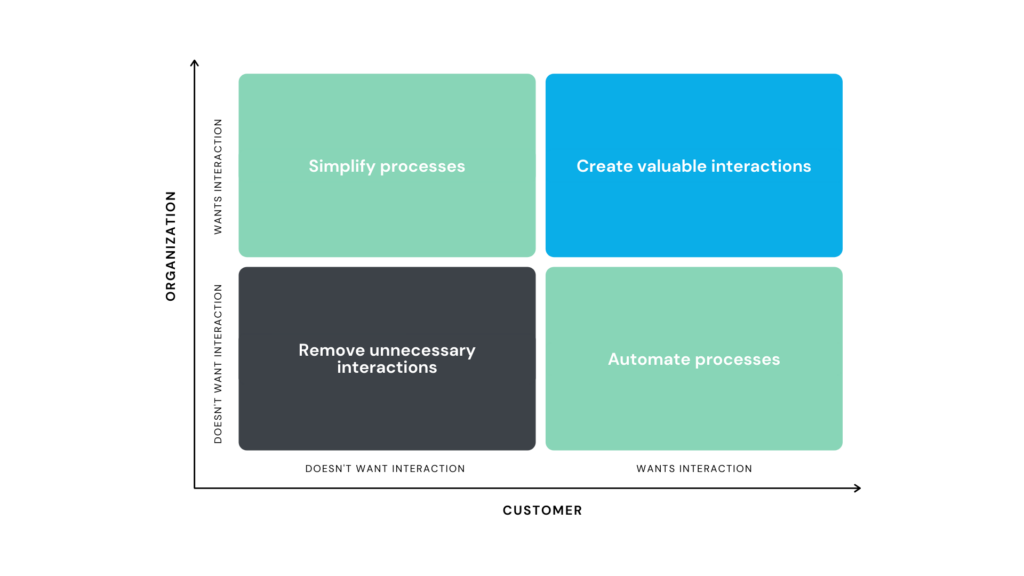As technology evolves and customer expectations change, businesses must adapt to meet the demands of today’s consumers. Building strong relationships and emotional connections with customers is critical to fostering loyalty. To achieve this, it is essential to empower customer service agents with greater responsibility and flexibility.
Customer service initiatives often fail because companies overlook the “moments of truth” – the conversations that build an emotional bond between the agent and the customer and create trust and loyalty towards the brand. Instead, too much effort is invested in transactional conversations that could be automated or eliminated.
The Value-Irritant Matrix is a helpful tool to determine whether to eliminate, simplify, automate, or leverage a conversation. Suppose a conversation stems from a misunderstanding or unclear information. In that case, the best course of action is to eliminate the conversation by providing relevant information on your website or self-service features. The conversation should be simplified if the company requires information from customers that they find annoying. If customers keep asking the same questions, the conversation should be automated. The goal is to invest only in conversations that provide value to both the customer and the organization.

The Value-Irritant Matrix is a helpful tool to determine whether to eliminate, simplify, digitize, or leverage a conversation.
To deliver exceptional customer service in these “moments of truth,” agents need the freedom to adapt to unique situations. Nordstrom and Ritz-Carlton are great examples of companies that prioritize customer service excellence by empowering their agents. Nordstrom encourages agents to think on their feet, with its employee handbook only having one rule, which is to “use good judgment in all situations.” Similarly, Horst Schulze, president of Ritz-Carlton, understood that customers expecting the best service did not want to hear, “I’ll check with management,” and therefore gave employees a discretionary fund of $2,000 per guest to use at their discretion to resolve any customer complaint.
By prioritizing performance over strict rule adherence, businesses can foster a culture of superior customer service that emotionally binds customers to their company. Giving agents the autonomy to make decisions also makes them feel trusted and valued, leading to increased job satisfaction and motivation, which helps lower employee turnover and onboarding and training costs. Empowered agents are more likely to take ownership of their work and provide a better service. In fact, a study of 88 retail stores found that performance was higher in stores where employees felt trusted.
Empowering agents to deliver superior service means giving them the tools they need to provide exceptional service. However, many contact centers still operate in silos, using standalone software solutions. This can be detrimental to customer satisfaction, as integrated customer service tools have been shown to increase satisfaction by 14%.
Since most businesses already use Microsoft Teams for internal communication and collaboration, it makes sense to integrate the contact center into the platform. This gives agents a singular identity, with one presence status and one tool for all interactions. That way, agents don’t have to switch between different applications, and all information is synched into one platform. Because everything is in Teams, agents also gain the flexibility to work from anywhere, which improves the employee experience and can increase employee retention.
Cloud-based solutions offer further benefits, such as the ability to empower agents to make simple changes, such as adjusting opening hours, without needing to consult with IT administrators. This increases flexibility and agility for the business and allows customer service to adapt to a fast-paced world. Contact managers can still exercise control, decide who can make these changes, and monitor real-time and historical data to ensure that everything runs smoothly. They can even remotely assist agents in customer calls with whisper, call, and barge-in functionality.
By integrating the contact center into Teams, the conversation takes center stage, creating an emotional connection between agents and customers. When we can hear and see each other, whether through video or audio, it fosters a deeper level of understanding and empathy. While contextual information from other business tools, such as a CRM or ticketing system, can still be integrated and displayed at the appropriate time, it’s critical to prioritize the conversation. This approach ensures that agents can provide efficient and personalized service, ultimately resulting in happy customers.

03.05.2023